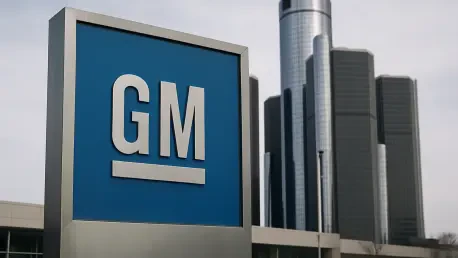In a rapidly evolving technological landscape, critical partnerships are being formed to address the rising demand for sustainable energy solutions. Recently, the collaboration between General Motors (GM) and Redwood Materials has taken center stage, aiming to fulfill the burgeoning needs of energy storage systems, particularly as artificial intelligence (AI) data centers expand swiftly. Underpinned by a non-binding memorandum of understanding, this partnership is exploring novel ways of utilizing both new and second-life batteries from GM’s electric vehicles to devise cost-effective energy storage systems. This initiative is a strategic component of Redwood’s new business unit, Redwood Energy, focused on assembling and deploying stationary energy storage solutions to meet domestic needs.
Addressing Energy Demands with Innovation
The nucleus of this partnership revolves around addressing the escalating electricity requirements driven by AI-powered infrastructures, such as data centers. Kurt Kelty, GM’s Vice President of batteries, propulsion, and sustainability, has underscored a critical need for energy storage solutions that are not only rapidly deployable and economically viable but also produced within the United States. GM and Redwood are working towards creating robust energy storage systems that leverage advanced battery recycling and repurposing technologies to meet these demands. The aim is to cultivate a domestic supply chain that is capable of supporting and enhancing energy storage solutions, thereby reducing reliance on foreign resources and fostering energy independence.
Redwood Materials has positioned itself as a leader in battery repurposing, with the ability to recycle approximately 20 gigawatt hours of batteries each year. This capacity equates to about 250,000 electric vehicles or nearly 90% of all lithium-ion batteries and battery materials that are recycled in North America, symbolizing the company’s substantial contribution to energy sustainability and resource efficiency. Through this partnership, GM is supplying used batteries to Redwood Materials, playing an integral part in what is touted as one of the most significant second-life battery developments globally. Furthermore, it is considered the largest microgrid in North America, strategically located in Sparks, Nevada. This microgrid is pivotal in providing electricity to AI infrastructure company Crusoe, illustrating the tangible advantages the collaboration aims to provide.
Strategic Growth in the EV Sector
JB Straubel, founder and CEO of Redwood Materials, accentuates that the transition towards electrification across numerous industries has fueled exponential growth in electricity demand. The strategic vision encapsulated by this partnership involves deploying GM’s second-life EV batteries alongside newly manufactured ones within Redwood’s energy storage architectures. This not only signifies a shift in how energy can be accessed and utilized but also reinforces America’s goal of achieving energy sovereignty while bolstering its manufacturing capabilities. Such an approach is anticipated to mitigate power shortages and enhance grid resilience, especially crucial during periods of peak demand.
The growth of AI data centers is on a trajectory to triple the percentage of national grid electricity consumed by 2028, accentuating the need for sophisticated energy storage solutions. The expected surge in storage units necessary to support such growth points to an escalating demand for innovations that can offset the potential for power delivery constraints. This partnership between GM and Redwood is indicative of strategic foresight, aiming to catalyze advancements in energy storage infrastructure that will underpin this digital era’s sweeping transformations.
Enhancing Sustainability Through Recycling
Moreover, the collaboration has also been bolstered by Redwood’s initiatives to recycle cathode and anode materials and production scrap from GM’s Ultium Cells battery joint venture facilities in Warren, Ohio, and Spring Hill, Tennessee. These recovered materials are earmarked for crafting new batteries, thereby amplifying resource sustainability and providing added value. Beyond its work with GM, Redwood Materials seeks to engage with other automotive industry giants—namely Toyota, Ford Motor Co., and Volvo Cars—under similar battery recycling structures. The overarching goal is to improve the sustainability of electric vehicle batteries while concurrently reducing dependency on imported essential raw materials, thus fostering a more self-sufficient supply chain.
A salient aspect of Redwood’s strategy includes a partnership initiated last September with BMW, focusing on recycling second-life batteries from the automaker’s extensive U.S. network. This comprehensive approach, encompassing roughly 700 locations, including dealerships and distribution centers, is designed to recover critical minerals—such as nickel, cobalt, lithium, and copper. The endeavor aims to reintegrate nearly 98% of these materials back into the domestic battery supply chain. Such initiatives contribute significantly towards nurturing a circular economy, ensuring the sustainability and resilience of the nation’s energy resources.
The Path Forward in Energy Innovation
In today’s swiftly changing tech world, crucial alliances are being built to cater to the increasing demand for eco-friendly energy solutions. A notable partnership recently formed is between General Motors (GM) and Redwood Materials, focusing on the growing need for energy storage, especially as AI-driven data centers continue to grow rapidly. This collaboration is guided by a non-binding memorandum of understanding, where both entities are exploring the innovative use of new and second-life batteries from GM’s electric vehicles to create affordable energy storage systems. This endeavor is a strategic aspect of Redwood’s newly established business unit, Redwood Energy, which is dedicated to developing and implementing stationary energy storage solutions to address domestic energy requirements. As AI technology expands and energy needs escalate, GM and Redwood are positioning themselves at the forefront of providing sustainable energy options, ensuring they meet the demands of the present while preparing for a greener future.









